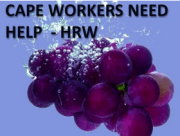
HRW calls for action on Cape workers. Picture: Des Latham, BDFM Online
|
 Human Rights Watch calls for action on Cape workers
Human Rights Watch calls for action on Cape workers
A report has called for the improvement of working conditions on wine farms, but the industry slams the document as poorly researched
DES LATHAM
Workers in the Western Cape who help produce SA’s renowned wines and fruit are denied adequate housing, proper safety equipment and basic labour rights, Human Rights Watch (HRW) said in a report released today.
HRW says government and industry leaders should act immediately to improve these conditions.
The 96-page report is called "Ripe with Abuse: Human Rights Conditions in SA’ Fruit and Wine Industries," and outlines conditions that include on-site housing that is unfit for living, exposure to pesticides without proper safety equipment, lack of access to toilets or drinking water while working and efforts to block workers from forming unions.
"The wealth and well-being these workers produce shouldn’t be rooted in human misery," said Daniel Bekele, Africa director at Human Rights Watch.
"The government, and the industries and farmers themselves need to do a lot more to protect people who live and work on farms."
But the wine industry has rejected the allegations, saying the HRW researchers conducted interviews based on hearsay.
Su Birch, CEO of Wines of SA (Wosa), says the document released by HRW this morning used a "questionable basis for the selection of many of the respondents interviewed in the study, while interviews with workers had not been independently verified and nor had employer reaction to allegations been sought".
"Readers of the report have no basis for understanding how representative the sample of respondents is," says Birch.
"The study relies on anecdotal evidence that uses the cover of respondent protection to avoid substantiating the claims it makes," she said. Moreover, the media release, provocatively entitled "South Africa: Farmworkers’ Dismal, Dangerous Lives" and distributed internationally to announce the report, does not present a sufficiently comprehensive picture of conditions across the wine industry and as a result, is potentially misleading, she adds.
"Like the report itself, the release disingenuously plays down the significance of the wine industry’s substantial direct and indirect contribution to improving working conditions through organisations such as the Wine Industry Ethical Trade Association and Fairtrade," says Birch.
"It also makes scant mention of empowerment initiatives. With positive examples of the progress made in redressing past wrongs rendered virtually inaccessible to all but the most serious readers, the report negates the work of those who should be allowed to stand out as role models to their peers."
But Human Rights Watch says it did conduct research on the ground.
"One farm worker showed Human Rights Watch researchers a former pig stall without electricity, water, or protection from the elements where he has lived with his wife and children for 10 years."
The report tallies a list of issues, such as working with pesticides, inadequate drinking water and farmers preventing workers from forming unions.
The organization says that labour inspections should now take place without notice as is the present practice in order to ensure improvements for workers.
But as part of the Fairtrade network, industry officials say SA has the highest number of Fairtrade-accredited wine producers worldwide and also rejected out of hand the allegation that farmers made workers use pesticides unprotected.
"Monitoring for compliance included blood testing amongst workers to check for pesticide residues and compliance is regularly and independently monitored. Producers who flout the regulations not only run the risk of losing their accreditation but also their ability to export," Birch said
Leading wine producer Distell said the report was biased and failed to take the entire industry into account.
Heidi Bartis, Distell communication manager, said labour unions have been actively supported.
"Annual negotiations take place between union members and the relevant unions and a substantive agreement is reached for a 12-month period. Where applicable, housing is made available but is linked to employment. In some instances housing is made available rent-free, with water and electricity also provided at no cost," she said.
"Free transport on some farms is offered to labourers to do their week-end shopping and to attend sports, school, religious and cultural events. Workers can join subsidised medical funds, while a mobile clinic service provides additional health support to labourers and their families. Functional literacy programmes, specialised agricultural training and crèche facilities are also available to workers across some of the farms."
lathamd@bdfm.co.za
(2011-8-23/businessday)
|





